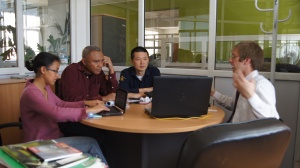
In late 2009, we at Human Network International decided to address a significant challenge we‘d heard about from other non-profit NGOs working in Madagascar: the absence of timely, reliable data from the field on which to base operational decisions. It was the same challenge each time: poor roads, vast distances and unreliable transportation made collecting data using the traditional pen-and-paper system impossible. Moreover, these organizations faced significant obstacles to modernizing their data collection systems: shortage of time, lack of adequate in-house IT expertise and considerable upfront cost. Our partners in Madagascar had an acute need to modernize their data collection techniques, but no viable solution.
As humanitarians, we wanted to assist these mission-driven organizations. As technologists, we believed we had the expertise to help. Mobile devices are inexpensive and ubiquitous in Madagascar (nearly one in three Malagasy citizens possess a cell phone). Mobile phone penetration and coverage areas are expanding daily. As such we focused our efforts on developing mobile phone reporting systems via SMS.
We began meeting separately with each organization to help identify individual need. By examining each organization’s overall goals and objectives and existing paper-based data collection systems, we helped each prioritize their key indicators/questions .
After we completed the needs assessment, HNI’s programming team created a separate custom data collection and communication application for each organization. Our partners worked in different development and relief sectors (Conservation, public health, natural disaster management). Each project had specific data collection needs. However every application we developed featured two main functions. Each of them 1) accepted answers sent in via SMS and displayed the results in a usable format and 2) allowed headquarters staff to send SMS messages back out to individuals based in the field. We essentially opened a new and direct line of communication between our partner’s headquarters staff and their employees in the field. Information then flowed back and forth along this new communication line.
In just a couple of months, we modernized our partner’s internal capacity to collect their own data. Our partners include some of the largest development agencies in the world and are all making major contributions:
- RTI’s Santénet2 Project (child and maternal health)
- Conservation International (environmental protection and awareness)
- Marie Stopes (reproductive health and family planning)
- The World Bank (HIV/AIDS medication tracking)
- Catholic Relief Services (Cyclone relief and disaster management and Water/Sanitation)
We learned a few things by working closely with these partners. First, while missions differ, the format of these organizations’ data collection needs didn’t. Organizations had a series of key questions they needed answered. The subject of these questions differed; some organizations focused on improving peoples’ health while others worked to maintain Madagascar’s incredible bio-diversity. However the format of their data collection needs was fairly standard: a questionnaire with 10-15 key questions and answers that were either numbers or text.
Secondly, we needed to do more to further reduce the barriers to mobile data collection. Our individual, customized approach was successful; we built our partners’ capacity to collect data themselves. However, we needed anywhere from 2-6 months to complete the job. This meant only the largest organizations in Madagascar could afford our services. Our face-to-face approach also meant we couldn’t build an organization’s capacity outside Madagascar, a request we were getting more and more frequently.
So around the middle of 2010, we decided to create an online do-it-yourself data collection service to eliminate the remaining barriers to mobile data collection. Thanks to our work with our partners in Madagascar, we had a sophisticated, step-by-step process already developed. This process went from an initial needs assessment all the way to how to present the display of the collected data. Our goal was to recreate this step-by-step process in our online tool, so organizations could follow the process themselves, online. We could then drastically reduce the cost and great expand the number of organizations we could help.
So the idea of DataWinners, the online, do-it-yourself data collection service was born. We decided that a hosted service that allows development organizations to create their own data collection projects has significant advantages over the one-off, tailored systems described above. Among the advantages:
Subscribe to DataWinners and start collecting data immediately as opposed to waiting months for professional software developers (like us!) to finish a custom solution.
- Collect as much data as you need. There’s no limit on the number of questionnaires you can collect, or the number of records your data senders can send in for each questionnaire.
- Modify your questionnaires immediately as your project’s needs change
- Access DataWinners online; no special software or complex configuration required.
- One low monthy fee. DataWinners is affordable (and you can try it free for one month) and does not require any long term contract or large upfront investment.
- DataWinners is dynamic. We’re adding new features in each new release; share your feedback with us and we’ll work to incorporate your ideas.
By focusing our efforts on DataWinners we hope to build our partners’ capacity to collect their own data, make better decisions and achieve their organizations’ missions throughout the developing world. Check back with us around the middle of December 2011 when we hope to go live worldwide with DataWinners.


